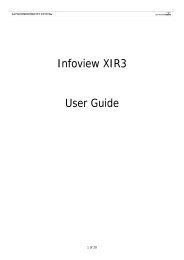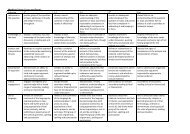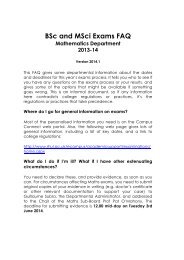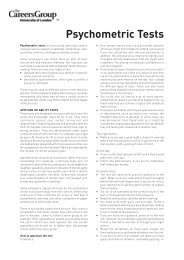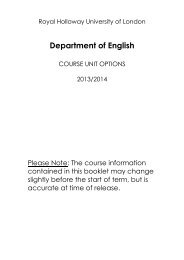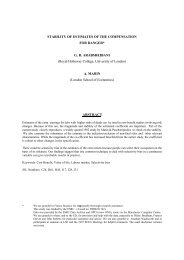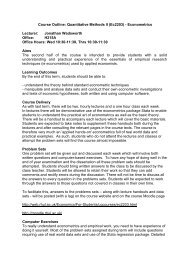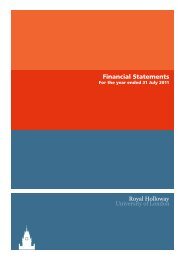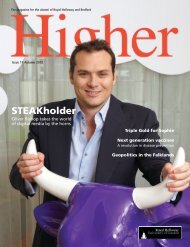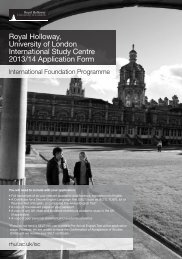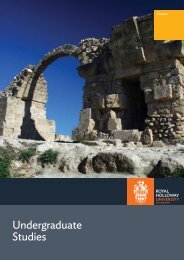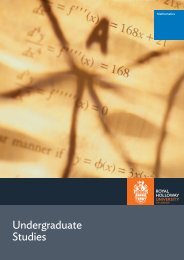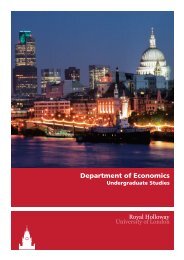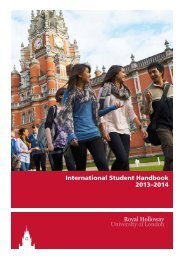a short history of the ISG - Royal Holloway, University of London
a short history of the ISG - Royal Holloway, University of London
a short history of the ISG - Royal Holloway, University of London
Create successful ePaper yourself
Turn your PDF publications into a flip-book with our unique Google optimized e-Paper software.
The Information Security Group - A Brief History<br />
postdoctoral researcher in Darmstadt (Germany) at <strong>the</strong> GMD - German<br />
National Research Centre for Information Technology (now part <strong>of</strong><br />
Fraunh<strong>of</strong>er) on biometrics and wireless communication protocols. In August<br />
2001, she joined <strong>the</strong> Information Security Group to work on an EU-project<br />
called SHAMAN (www.ist-shaman.org). Scarlet was appointed as lecturer in<br />
Information Security at <strong>the</strong> beginning <strong>of</strong> 2003. Her special interests are<br />
security in mobile wireless networks, ID management and Biometrics.<br />
Allan Tomlinson BSc (Strathclyde) MSc PhD (Edinburgh)<br />
Allan Tomlinson received his BSc in Applied Physics from Strathclyde in<br />
1981, his MSc in Microelectronics in 1987 and doctorate in 1991, both from<br />
Edinburgh. He <strong>the</strong>n joined <strong>the</strong> Institute <strong>of</strong> Microelectronics at <strong>the</strong> National<br />
<strong>University</strong> <strong>of</strong> Singapore, working on secure NICAM broadcasting and video<br />
compression. In 1994, he moved to GI in California to work on <strong>the</strong><br />
Digicipher II Conditional Access system for digital video broadcasting.<br />
Before joining <strong>the</strong> Information Security Group, he was Principal Engineer at<br />
Barco Communications Systems where he was responsible for <strong>the</strong><br />
development <strong>of</strong> <strong>the</strong> “Krypton” DVB Video Scrambler. He also served for a<br />
number <strong>of</strong> years on <strong>the</strong> DVB Simulcrypt committee. He is currently a<br />
lecturer in <strong>the</strong> Information Security Group.<br />
Pr<strong>of</strong>essor Michael Walker BSc PhD (<strong>London</strong>) Dr.rer.nat.(habil)<br />
(Tübingen) FREng FIEE CMath FIMA<br />
Michael Walker is <strong>the</strong> Research and Development Director for <strong>the</strong> Vodafone<br />
Group, <strong>the</strong> Vodafone Pr<strong>of</strong>essor <strong>of</strong> Telecommunications at <strong>Royal</strong> <strong>Holloway</strong> and<br />
a visiting pr<strong>of</strong>essor at <strong>the</strong> <strong>University</strong> <strong>of</strong> Surrey. He is responsible for research<br />
and development across <strong>the</strong> Vodafone Group, including <strong>the</strong> company’s<br />
contributions to international standards and protection <strong>of</strong> its intellectual<br />
property. His work is concerned in <strong>the</strong> broadest sense with wireless and<br />
Internet communications. This includes spectrum, radio access,<br />
telecommunications networks, security <strong>of</strong> communications and applications in<br />
commerce, transport and o<strong>the</strong>r areas. Prior to joining Vodafone, he was Head<br />
<strong>of</strong> Ma<strong>the</strong>matics at Racal Research Ltd, where he led a number <strong>of</strong> UK and EU<br />
collaborative projects on security for mobile communications and designed<br />
cryptographic algorithms, security and coding schemes for commercial and<br />
military systems. He also acted as a security consultant to a number <strong>of</strong><br />
financial institutions. Before joining Racal, he was a lecturer at <strong>the</strong> <strong>University</strong> <strong>of</strong><br />
Tübingen where his research interests included finite geometry, groups,<br />
combinatorics and coding <strong>the</strong>ory. Pr<strong>of</strong>essor Walker has been chairman <strong>of</strong> a<br />
number <strong>of</strong> international standards groups, including 3GPP SA3, which is<br />
responsible for <strong>the</strong> security <strong>of</strong> <strong>the</strong> GSM and UMTS mobile communications<br />
systems. He is a member <strong>of</strong> <strong>the</strong> UK Government Technology Strategy Board,<br />
and sits on academic advisory boards at <strong>the</strong> Universities <strong>of</strong> Surrey and<br />
Warwick.<br />
Pr<strong>of</strong>essor Peter Wild BSc (Adelaide) PhD (<strong>London</strong>) Director,<br />
Information Security Group<br />
Peter Wild received his BSc (Hons) degree in Pure Ma<strong>the</strong>matics in 1976<br />
from <strong>the</strong> <strong>University</strong> <strong>of</strong> Adelaide and <strong>the</strong> PhD degree in Ma<strong>the</strong>matics in 1980<br />
from <strong>the</strong> <strong>University</strong> <strong>of</strong> <strong>London</strong>. He has worked at <strong>the</strong> Ohio State <strong>University</strong>,<br />
Columbus, Ohio, <strong>the</strong> <strong>University</strong> <strong>of</strong> Adelaide and <strong>the</strong> CSIRO, Australia. In<br />
14



